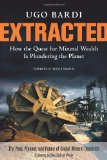 My Rating: 7 /10
My Rating: 7 /10
Title: Extracted, How the Quest for Mineral Wealth is Plundering the Planet (Amazon Link)
Author: Ugo Bardi
Extracted could be described as the story of society’s resources. Where they’ve come from and where they’re going. These resources have enabled society to develop the modern technologies underpinning our current way of life. Along with this comes a level of dependence on mineral resources. One that would be difficult to replace should the resources run out.
Resource extraction or, as I like to say, running (thermodynamically) downhill
The formation of a mineral deposits is a long, uphill process that continuously fights the second law of thermodynamics, which states that the entropy of a system will increase over time. A mineral deposit is typically a localised region of low entropy (i.e. disorder), that is created as a by-product of the huge amounts of energy driving geologic, and occasionally biological, processes. Over long time-scales (often millions of years), these processes can lead to the accumulation of valuable minerals and energy within geologic structures. It is from these pockets of resources that society now extracts the material and energy required to sustain and grow our livelihood.
This poses an obvious question. What happens when the resources, that have taken millions of years to form, run out?
“In the 1920s, the coal produced in England could have matched the heat produced by burning almost all of the world’s forests.”
I think most people underestimate just how quickly we are extracting resources to feed society. One thing that Extracted does particularly well is to provide analogies that can make large quantities somewhat comprehensible for the average person.
Take for instance, the overall rate that human’s mine resources. This varies depending upon what you consider a resource, but can generally be measured in at least the tens of billions of tonnes of material a year. To put this in perspective, every year the biosphere produces roughly 56 billion tonnes of new biomass every year. Around 1% of this must be extracted by plants from the ground (most comes from the atmosphere). So if you consider all the plants on earth, they are only mining about half a billion tonnes of material from the earth’s crust every year. Considerably less than mankind currently extracts.
Another example is fertile agricultural soil, which could be considered our most valuable resource. Unfortunately we are causing the erosion of this resource at an enormous rate. In the US, about 4 billion tonnes of agricultural soil is eroded every year. Globally estimates of this erosion range from 75 to 120 billion tonnes per year. Currently this is about an order of magnitude faster than what could be considered the natural erosion rate. To counteract this we are applying phosphorous and nitrogen based fertilisers to soils at a very large rate. This has been fueling the recent concerns over the long-term availability of phosphorous resources, as this is an ingredient of plant growth that can’t be substituted. Current estimates of phosphorous resources may only last us a century or two. What happens then? Well no-one really knows…
Why the 7/10 rating?
I view Extracted as a book of two parts. The first part I would rate 8/10, and the second part only 6/10.
Part 1 is the main text, written by Ugo Bardi, that provides an interesting overview of the story of resources. This covers a lot of ground including:
- Resource formation.
- How resources have fueled society – from our technology development, to our economic systems and our wars.
- Resource depletion and constraints for the future.
- The interactions between geologic processes and global climate.
- Energy – In particular coal, oil, gas and nuclear
- Politics and policy.
- Our response – What options do we have?
Generally I felt this part was fairly solid and there was a lot of insights to be gleaned from this.
Part 2 is the several page case studies that were written by contributing authors and scattered at regular intervals throughout the book. These case studies provide an overview of resource depletion issues for particular mineral resources (e.g. phosphorous, copper, coal, oil, etc.). Unfortunately the quality of these case studies was highly variabile, with some being well researched and others not. This is unfortunate given the ongoing debate around resource depletion is commonly discussed in the context of specific commodities (most commonly oil), and that providing poorly justified information can lead to people dismissing the entire issue on the basis of several factual or conceptual errors.
I’m not usually one to nitpick over referencing, particularly for books written as prose. However given my vested academic interest in this subject, I paid more attention to it then I normally would with this type of book. The referencing in Extracted was very inconsistent, often favouring secondary sources over primary sources. This can be a grey area when it comes to referencing, but unfortunately I came across examples of colleague’s work being mis-attributed to others in this way. Despite this shortcoming, it is an aspect of the book that probably wouldn’t change the experience of the average reader.
Final Thoughts
Extracted is a book that I would recommend for anyone with an interest in long-term thinking, sustainability and the underpinnings of modern society. I found it to be an engaging read, despite some of the shortcomings of the individual case studies presented.
Have you read any similar books recently? Why not leave a comment below and let everyone know what you thought.
Thanks for reading.
– Stephen
Click here to see other reviews of Extracted by Ugo Bardi at Amazon.com.
Share this:
Pingback: EXTRACTED | THE CLUB OF ROME (www.clubofrome.org)